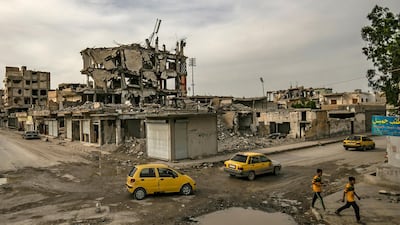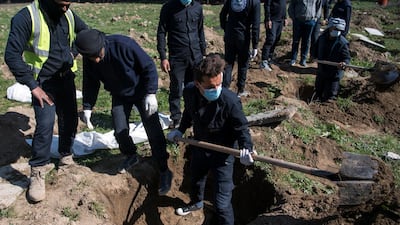The cruelty of the ISIS terror group is well-documented. Mass murder, ethnic cleansing, the enslavement of the Yazidis, the recruitment and indoctrination of child soldiers, the forced displacement of Christians, the execution of journalists and aid workers and the destruction of cultural heritage are merely some of the war crimes and crimes against humanity that the group committed during its brutal reign.
The purging of the group in 2017 from its main strongholds in Raqqa and Mosul and its subsequent military defeat put an end to this brutality. But three years after the fall of its self-proclaimed capital in Syria, mass graves of its victims are still being found, and many thousands remain unaccounted for. Their families still suffer.
In September, a collective of first responders operating under the aegis of local authorities in Raqqa, Hasakah and Deir Ezzor, three of the provinces that suffered the most under ISIS, said it had uncovered five mass graves in northeast Syria in 2020 alone, including three at the location of former ISIS prisons and detention centres. In total, 28 mass graves have been uncovered by the teams since the terror group's defeat – containing 4,072 bodies. Most of them have not been identified.
Back in early 2018, I reported on an online group that was founded by a Syrian man from Raqqa whose brother was made to disappear by ISIS in 2013. Called “Where are the Kidnapped by ISIS?”, the page continues to post images sent by families and loved ones of their disappeared relatives, hoping one day for answers.
Those answers may be a long time coming because the lives of ordinary Syrians were always secondary to the aims of the combatants in the country. The global coalition’s campaign against ISIS was meant to safeguard against the group’s ability to strike and carry out spectacular terror attacks abroad, not its abuses against Syrian civilians, who were killed in the hundreds of thousands during the civil war, most of them at the hands of the Syrian government.
The lack of closure regarding the fate of those civilians who were held in ISIS makeshift prisons continue to torment their loved ones.
Then there is the question of justice – if and when the bodies are ever identified. Who will be held to account for these widespread abuses?
It is telling that few ISIS operatives have faced anything besides direct mortal retribution for the crimes they visited, such as the many who were sentenced to death in Iraqi courts or killed in American airstrikes.
The unknown fate of civilians held in ISIS makeshift prisons will continue to torment their loved ones
Those who are facing trial do so because they committed crimes against westerners.
Last month, a British court cleared the way for evidence to be transferred to the US Justice Department in the case of the ISIS "Beatles," two executioners who orchestrated the videotaped killings of journalists and aid workers like James Foley. This will allow their trial to proceed in the US.
This should be the norm, rather than the exception. ISIS operatives captured by Kurdish and American forces, and those repatriated to their home countries in the Middle East and the West, should be tried for the crimes they committed. Such trials should take place under the aegis of an organisation such as the International Criminal Court since the criminals span such a broad range of nationalities and ethnicities, and to build a fuller picture of the systematic crimes carried out by the group.
It will be a long and difficult journey for the families of ISIS victims. They may never find out the fates of their loved ones. Seeing their killers held to account may bring some answers – or at least a measure of succour.
Kareem Shaheen is a veteran Middle East correspondent in Canada and columnist for The National
88 Video's most popular rentals
Avengers 3: Infinity War: an American superhero film released in 2018 and based on the Marvel Comics story.
Sholay: a 1975 Indian action-adventure film. It follows the adventures of two criminals hired by police to catch a vagabond. The film was panned on release but is now considered a classic.
Lucifer: is a 2019 Malayalam-language action film. It dives into the gritty world of Kerala’s politics and has become one of the highest-grossing Malayalam films of all time.
The specs
Engine: 2.3-litre, turbo four-cylinder
Transmission: 10-speed auto
Power: 300hp
Torque: 420Nm
Price: Dh189,900
On sale: now
Dubai Rugby Sevens
November 30-December 2, at The Sevens, Dubai
Gulf Under 19
Pool A – Abu Dhabi Harlequins, Jumeirah College Tigers, Dubai English Speaking School 1, Gems World Academy
Pool B – British School Al Khubairat, Bahrain Colts, Jumeirah College Lions, Dubai English Speaking School 2
Pool C - Dubai College A, Dubai Sharks, Jumeirah English Speaking School, Al Yasmina
Pool D – Dubai Exiles, Dubai Hurricanes, Al Ain Amblers, Deira International School
COMPANY%20PROFILE
%3Cp%3E%3Cstrong%3ECompany%20name%3A%3C%2Fstrong%3E%20OneOrder%3Cbr%3E%3Cstrong%3EStarted%3A%3C%2Fstrong%3E%20March%202022%3Cbr%3E%3Cstrong%3EFounders%3A%3C%2Fstrong%3E%20Tamer%20Amer%20and%20Karim%20Maurice%3Cbr%3E%3Cstrong%3EBased%3A%3C%2Fstrong%3E%20Cairo%3Cbr%3E%3Cstrong%3ENumber%20of%20staff%3A%20%3C%2Fstrong%3E82%3Cbr%3E%3Cstrong%3EInvestment%20stage%3A%3C%2Fstrong%3E%20Series%20A%3C%2Fp%3E%0A
Pharaoh's curse
British aristocrat Lord Carnarvon, who funded the expedition to find the Tutankhamun tomb, died in a Cairo hotel four months after the crypt was opened.
He had been in poor health for many years after a car crash, and a mosquito bite made worse by a shaving cut led to blood poisoning and pneumonia.
Reports at the time said Lord Carnarvon suffered from “pain as the inflammation affected the nasal passages and eyes”.
Decades later, scientists contended he had died of aspergillosis after inhaling spores of the fungus aspergillus in the tomb, which can lie dormant for months. The fact several others who entered were also found dead withiin a short time led to the myth of the curse.
BEETLEJUICE BEETLEJUICE
Starring: Winona Ryder, Michael Keaton, Jenny Ortega
Director: Tim Burton
Rating: 3/5
Groom and Two Brides
Director: Elie Semaan
Starring: Abdullah Boushehri, Laila Abdallah, Lulwa Almulla
Rating: 3/5
Ahmed Raza
UAE cricket captain
Age: 31
Born: Sharjah
Role: Left-arm spinner
One-day internationals: 31 matches, 35 wickets, average 31.4, economy rate 3.95
T20 internationals: 41 matches, 29 wickets, average 30.3, economy rate 6.28
The National Archives, Abu Dhabi
Founded over 50 years ago, the National Archives collects valuable historical material relating to the UAE, and is the oldest and richest archive relating to the Arabian Gulf.
Much of the material can be viewed on line at the Arabian Gulf Digital Archive - https://www.agda.ae/en
The specs
Engine: 1.6-litre 4-cyl turbo
Power: 217hp at 5,750rpm
Torque: 300Nm at 1,900rpm
Transmission: eight-speed auto
Price: from Dh130,000
On sale: now
The schedule
December 5 - 23: Shooting competition, Al Dhafra Shooting Club
December 9 - 24: Handicrafts competition, from 4pm until 10pm, Heritage Souq
December 11 - 20: Dates competition, from 4pm
December 12 - 20: Sour milk competition
December 13: Falcon beauty competition
December 14 and 20: Saluki races
December 15: Arabian horse races, from 4pm
December 16 - 19: Falconry competition
December 18: Camel milk competition, from 7.30 - 9.30 am
December 20 and 21: Sheep beauty competition, from 10am
December 22: The best herd of 30 camels
Scoreline
Liverpool 3
Mane (7'), Salah (69'), Firmino (90')
Bournemouth 0
COMPANY PROFILE
Founders: Alhaan Ahmed, Alyina Ahmed and Maximo Tettamanzi
Total funding: Self funded
Syria squad
Goalkeepers: Ibrahim Alma, Mahmoud Al Youssef, Ahmad Madania.
Defenders: Ahmad Al Salih, Moayad Ajan, Jehad Al Baour, Omar Midani, Amro Jenyat, Hussein Jwayed, Nadim Sabagh, Abdul Malek Anezan.
Midfielders: Mahmoud Al Mawas, Mohammed Osman, Osama Omari, Tamer Haj Mohamad, Ahmad Ashkar, Youssef Kalfa, Zaher Midani, Khaled Al Mobayed, Fahd Youssef.
Forwards: Omar Khribin, Omar Al Somah, Mardik Mardikian.





